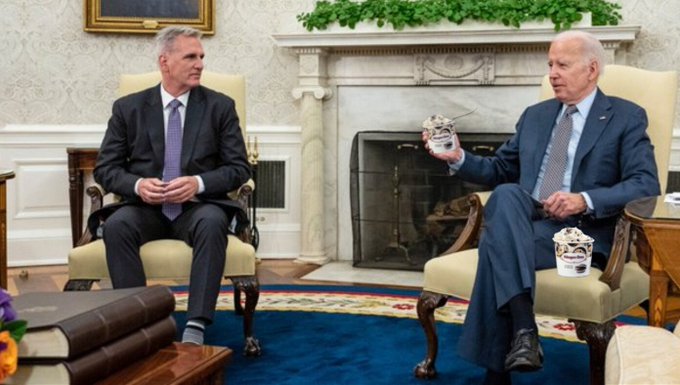Facing the prospect of having to default on its debt for the first time in United States’ history, President Joe Biden and House Speaker Kevin McCarthy reached final agreement yesterday on a deal to raise the nation’s debt ceiling while trying to ensure enough Republican and Democratic votes to pass the measure in the coming week.
Biden confirmed that an in-principle agreement had been reached hours after anonymous sources had told reporters about it.
“Speaker McCarthy and I reached a bipartisan budget agreement that will prevent the worst possible crisis – a default for the first time in our nation’s history. This deal is good news for the American people. I strongly urge Congress to pass the agreement right away,” Biden tweeted.
The US Congress will vote on the deal to extend the government borrowing authority on Wednesday, just shy of the June 5 ‘X-date’ when the Treasury estimates the government will no longer be able to pay its bills, plunging the world's biggest economy into turmoil.
"After weeks of negotiations we have come to an agreement in principle," McCarthy, the speaker of the Republican-held House of Representatives, said.
McCarthy, who spoke with Biden on Saturday to close the deal, said he would consult again with Biden said in his own statement that the deal was "good news for the American people, because it prevents what could have been a catastrophic default and would have led to an economic recession, retirement accounts devastated, and millions of jobs lost."
Raising the debt ceiling – a legal maneuver that takes place most years without drama – allows the government to keep borrowing money and remain solvent.
This year, Republicans demanded deep spending cuts – largely in social spending for the poor – in return for raising the debt ceiling, saying the time had come for bitter medicine to address the country's mammoth USD 31 trillion debt.
Biden argued that he would not negotiate over spending issues as a condition for raising the debt ceiling, accusing the Republicans of taking the economy hostage.
Both sides seemed to have agreed on a compromise. Negotiators rushed to draft the bill text so lawmakers can review clauses that neither the hard-right or left flank is likely to support.
According to US media reports, the outline of the deal includes freeing up the debt ceiling for two years, meaning there will be no need for negotiations in 2024, when the nation is in full Presidential election swing.
The big spending cuts Republicans wanted are not there, according to reports, but effectively a budget freeze will take effect. There will also be tougher rules on accessing unemployment benefits and other federal assistance.
Biden said "the agreement represents a compromise, which means not everyone gets what they want. That's the responsibility of governing."
Default consequences
Should the US breach the debt ceiling, the costs to the economy would be likely to be quickly felt. The government wouldn't miss loan repayments until mid-June but in the meantime it would likely have to halt USD 25 billion in social security checks and federal salaries.
The battle has been monitored closely by the major ratings agencies. Mark Zandi, Chief Economist of Moody’s Analytics, predicted that even with a brief default, a “crisis, characterized by spiking interest rates and plunging equity prices, would be ignited. Short-term funding markets, which are essential to the flow of credit that helps finance the economy’s day-to-day activities, likely would shut down as well.”
When Barack Obama's administration narrowly averted a default 12 years ago, a ratings downgrade cost taxpayers more than USD 1 billion in higher interest costs.



